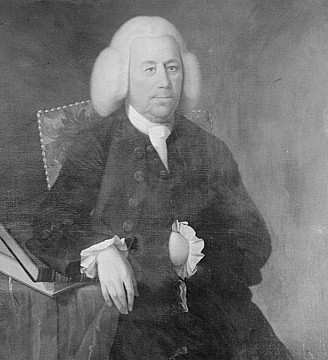Col. Gabriel George Ludlow (1736-1808)
President of the King's Council & Commander-in-Chief of New Brunswick
He was born in New York City and in 1759 was appointed a Governor of King's College (Columbia College), New York, but resigned in 1770. After his marriage in 1760 he retired to his 140-acre country estate, Hyde Park, north of Hempstead on Long Island that was later occupied by the celebrated English reformist William Cobbett (1763-1835). Up until 1783, he remained active in public affairs in Queens County serving as Colonel of the County Militia and Justice of the Peace. He was a staunch Loyalist and on the outbreak of Revolution became Colonel of the 3rd Battalion of Oliver DeLancey's Royal American Regiment. From 1777 to 1783 his Battalion was stationed at Brookhaven but was disbanded in Nova Scotia after the war. Having been named with his brother George in the Act of Attainder (1779) all their property was confiscated.
In England, Gabriel and his brother obtained appointments as King Councils for the newly created Province of New Brunswick where they were granted land in and around Carleton. In December, 1784, they sent for their families to join them there and they were lucky to reach their new home after their was ship was wrecked off Schoodick Point on the Massachusetts coast. Gabriel sat on the City Council and served as the 1st Mayor of St. John, New Brunswick (1785-1795); Judge of the Vice Admiralty Court (1787-1803); President of the King's Council of New Brunswick (1803-1808); and, the King appointed him Commander-in-Chief of New Brunswick, a position he held until his death. He built and lived in a substantial mansion at St. John known as "the old Government House" and died at Carleton with a full military funeral. His wife, Anne, was the sister of Samuel Verplanck, co-founder of the New York Chamber of Commerce. They had four children.
In England, Gabriel and his brother obtained appointments as King Councils for the newly created Province of New Brunswick where they were granted land in and around Carleton. In December, 1784, they sent for their families to join them there and they were lucky to reach their new home after their was ship was wrecked off Schoodick Point on the Massachusetts coast. Gabriel sat on the City Council and served as the 1st Mayor of St. John, New Brunswick (1785-1795); Judge of the Vice Admiralty Court (1787-1803); President of the King's Council of New Brunswick (1803-1808); and, the King appointed him Commander-in-Chief of New Brunswick, a position he held until his death. He built and lived in a substantial mansion at St. John known as "the old Government House" and died at Carleton with a full military funeral. His wife, Anne, was the sister of Samuel Verplanck, co-founder of the New York Chamber of Commerce. They had four children.




